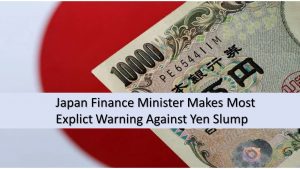Japan Finance Minister makes most explicit warning against yen slump

Japanese Finance Minister Shunichi Suzuki said on Tuesday the damage to the economy from a weakening yen at present is greater than the benefits accruing to it, making the most explicit warning yet against the currency’s recent slump versus the dollar.
The yen’s fall has worsened imported inflationary pressures in Japan amid a spike in global commodity and oil costs, and an increase in supply snags, which have intensified in the wake of the Ukraine crisis.
“Stability is important and sharp currency moves are undesirable,” Suzuki told parliament, repeating previous comments as the Japanese currency weakened to fresh 20-year lows on the dollar.
“A weak yen has its merit, but demerit is greater under the current situation where crude oil and raw materials costs are surging globally, while the weak yen boosts import prices, hurting consumers and firms that are unable to pass on costs,” Suzuki said.
Suzuki declined to comment on how the government and the Bank of Japan should respond to the yen’s weakening, including whether intervening in the market is an option.
His remarks came before his trip to Washington to attend a gathering of financial leaders from the Group of 20 (G20) major economies this week. Among the many discussions, the minister is also scheduled to a hold a meeting with U.S. Treasury Secretary Janet Yellen.
Suzuki vowed to stick to Group of Seven (G7) advanced economies’ agreement on currencies and closely communicate with U.S. and other countries’ currency authorities to “respond appropriately” to currency movements.
G7’s fundamental stance is that currency rates are set by the market and that members will closely consult with each other on any action in the foreign exchange market. The group further acknowledges that excess volatility and disorderly moves can adversely affect economic and financial stability.
Important Note: The information found on Ausprime platform is intended only to be informative, is not advice nor a recommendation, nor research, or a record of our trading prices, or an offer of, or solicitation for a transaction in any financial instrument and thus should not be treated as such. The information provided does not include any specific investment objectives, financial situation and needs of any specific person who may receive it. The past performance is not a reliable indicator of future performance and/or results. Past Performance or Forward-looking scenarios are not a guarantee of future performance. Actual results may differ materially from those anticipated in forward-looking or past performance statement
